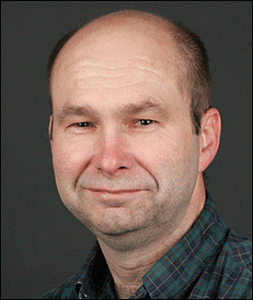The University’s Social Responsibilities – A Faculty View of the CFT’s 25th Anniversary Symposium
This is a guest post by Doug Fisher. Doug is an associate professor of computer science and computer engineering. Doug also recently served as a program director in the National Science Foundation’s Division of Information and Intelligent Systems. This post is part of our series of posts related to the CFT’s 25th anniversary.
 I thoroughly enjoyed the CFT’s Future of Teaching symposium. The opening remarks by faculty panelists on technology, societal issues, and economic challenges were informative and surprisingly moving in places. I attended the break out sessions on teaching societal issues, which have particularly engaged me for the past nine years.
I thoroughly enjoyed the CFT’s Future of Teaching symposium. The opening remarks by faculty panelists on technology, societal issues, and economic challenges were informative and surprisingly moving in places. I attended the break out sessions on teaching societal issues, which have particularly engaged me for the past nine years.
In my 25 years teaching computer science at Vanderbilt, I have rightfully focused on the technical concepts important to the computing professionals that my students would become, but for much of this time I did this to the near exclusion of discussion of societal issues in the classroom. I didn’t think it was my place to address such issues, if I was conscious of it at all. There was a “Computing and Society” course to cover this material, and surely my colleagues in the humanities were also engaging CS students on societal issues.
In late 2002, my philosophy regarding societal issues in my classes started changing. I became a faculty member in residence, first at North Hall, then Kissam, and for the last six years at McGill Hall. In residence halls I was engaging in wider-ranging discussions with students, learning that they had significant concerns over their future with respect to issues like adequate living wages and climate change; in fact, students awakened me to some of these issues. Coincident with this, my department of Electrical Engineering and Computer Science began working towards new accreditation standards, with desiderata that graduates be guided by an understanding of contemporary societal implications of the technology that they would be building. For the courses that I teach, these societal issues include patient and consumer data privacy; environmental implications of energy and material requirements of computers; implications of energy saved by computers such as in smart buildings; and improved stewardship facilitated by environmental and medical informatics, optimization, and other artificial intelligent technologies to promote rational decision making for long-term planning.
I see these obvious links now, but the first time my Chair asked me to prepare materials on assessing student understanding of contemporary issues in my lower-division data structures class I was taken aback. Rather quickly though I became a believer that leaving societal implications exclusively in the hands of non-technical courses modeled a compartmentalization that did not encourage the development of citizen engineers, and in a time of transformative technology, citizen engineers are an absolute necessity.
There are three themes in the societal issues breakout discussions at the CFT symposium that stick with me. The first is the desirability of interdisciplinary courses, not just to educate students, but also to educate faculty. Following the general discussion, I talked at some length with a teacher of religion during a break, and we agreed how much fun it would be to co-teach a course on ‘Theology and Artificial Intelligence’, which might very well be the most popular course I would ever teach! Beyond fun, students and faculty alike would learn from a tighter integration of technology and humanities that such a class would invite. A tighter coupling between social/behavioral sciences and technology would also be highly desirable to better understand the influences of technology on human behavior.
A second theme of our breakouts was on faculty reward structures that would encourage deeper treatment of societal issues in teaching, and for that matter research as well. An agency like the National Science Foundation encourages substantive treatment of broader impacts of science in proposals, and the integration of research and education, both of which were motivations for its well-known CAREER program. In addition to these outside influences, the consensus in the breakout seemed to be that universities unilaterally institute rewards of the diverse competencies among faculty and staff that are important in the development of motivated, as well as knowledgeable citizens.
A final theme was the desire to see a tight-knit community of students, faculty, administrators, and other staff, to include those who clean our dorms. The softening of boundaries between these populations may well be a natural outgrowth of the residential college system – it’s hard to imagine that it be otherwise over the long haul. I believe that the feeling of the breakout was that there could be no better way of manifesting a concern with societal issues than to practice it within campus communities; what better environment is there than a college campus like Vanderbilt to model the diverse, yet tight knit communities that we would like to see in the larger world?
In general, I was impressed that these three themes were about removing or softening boundaries of one sort or another. I am looking forward to similar workshops in the future, and I hope I won’t have to wait 25 years for the next one! Thank you CFT for your vitally important service.
We occasionally feature guest posts here on the blog as part of our efforts to cultivate dialogue about teaching and learning among Vanderbilt faculty, students, and staff. We recognize that everyone’s teaching context is different, but we hope that hearing others’ perspectives on teaching and learning will help our readers reflect on their own teaching. If you would like to contribute a guest post, please let us know.

Leave a Response